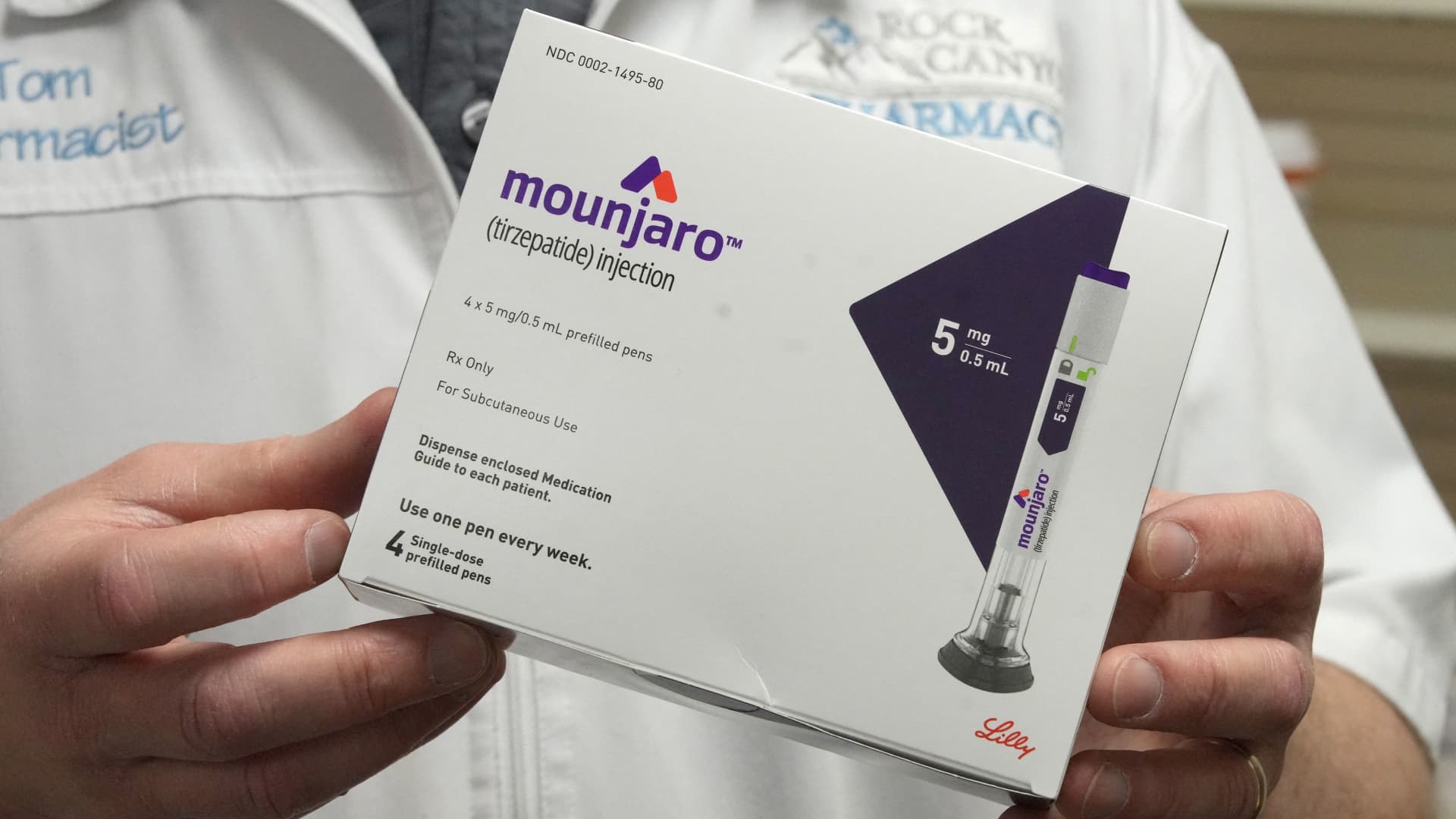The blockbuster diabetes drug Mounjaro is more effective for weight loss than another highly popular treatment, Ozempic, in overweight or obese adults, according to a large analysis of real-world data published Monday.
Patients taking Eli Lilly‘s Mounjaro were significantly more likely to lose weight and saw larger reductions in body weight at specific time points compared to those on Novo Nordisk‘s Ozempic in the study by Truveta Research. The firm compiles and analyzes patient data from a collective of health-care systems.
The results come as both drugs and similar treatments approved for weight loss soar in demand in the U.S. for their ability to help patients shed unwanted pounds over time. The wider adoption has boosted shares of Eli Lilly and Novo Nordisk this year.
Mounjaro and Ozempic are only approved for the treatment of Type 2 diabetes, but many people use the weekly injections off-label to lose weight.
Previous head-to-head studies have similarly suggested that Mounjaro is more effective than Ozempic for weight loss and controlling blood sugar in adults with Type 2 diabetes.
But Monday’s study confirms Mounjaro’s edge over Ozempic in a real-world setting, specifically among adults who are overweight or obese. Notably, head-to-head clinical trials in that population are not yet available, according to Truveta Research.
Eli Lilly is pitting Mounjaro against Wegovy, a higher dose version of Ozempic approved for weight loss, in an ongoing clinical trial in obese or overweight patients. But results won’t be released until next year.
“We’ve been able to compare the head-to-head efficacy of these two important medications for weight loss in advance of randomized clinical trials,” said Dr. Nick Stucky, an author of the study and vice president of Truveta Research, in a statement. “This study can help to inform patient care and outcomes today, not months from now.”
Study results on Mounjaro and Ozempic
Truveta Research specifically examined health-care data on roughly 18,000 adults who are overweight or obese and first started taking Mounjaro or Ozempic between May 2022 and September 2023. Nearly 52% of those patients had Type 2 diabetes.
Researchers found that patients taking Mounjaro were three times more likely to lose 15% of their weight than those on Ozempic. Patients on Mounjaro were also 2.6 times more likely to achieve 10% weight loss and 1.8 times more likely to lose 5% of their weight.
Those taking Mounjaro also experienced “significantly larger reductions” in body weight at specific time points, according to Truveta Research.
At three months, patients on Mounjaro lost 5.9% of their weight, while those on Ozempic lost 3.6%. At six months, people taking Mounjaro lost 10.1% of their weight, while patients on Ozempic lost 5.9%. And at one year, those on Mounjaro lost 15.2% of their weight, while those on Ozempic lost 7.9%.
Truveta Research also found that patients without Type 2 diabetes lost more weight than those with the condition. But the differences in effectiveness between Mounjaro and Ozempic were similar in both populations.
Rates of adverse gastrointestinal events were similar between patients taking Mounjaro and Ozempic.
The big difference between the weekly injections
Mounjaro and Ozempic are both weekly injections that change the way patients eat and lead to decreased appetite by mimicking certain hormones in the gut. They both have weight loss drug counterparts that use the same active ingredient: Eli Lilly’s newly approved Zepbound and Novo Nordisk’s Wegovy.
Ozempic and Wegovy only mimic one hunger-regulating hormone called glucagon-like peptide-1, also known as GLP-1, which increases the feeling of fullness and lowers blood sugar levels.
Meanwhile, Mounjaro and Zepbound mimic GLP-1 and another hormone in the gut called glucose-dependent insulinotropic polypeptide, or GIP.
The dual approach means that Mounjaro and Zepbound have an enhanced effect on regulating appetite and blood sugar levels, which some experts say could potentially lead to more significant weight loss than medications only targeting GLP-1.
In a late-stage study of more than 2,500 adults with obesity but not diabetes, those taking 5 milligrams of Zepbound for 72 weeks lost about 16% of their body weight on average. Higher doses of the drug were associated with even more weight loss, with a 15-milligram dose leading to 22.5% weight loss on average.
More than two in five adults have obesity, according to the National Institutes of Health.
About one in 11 adults have severe obesity.
